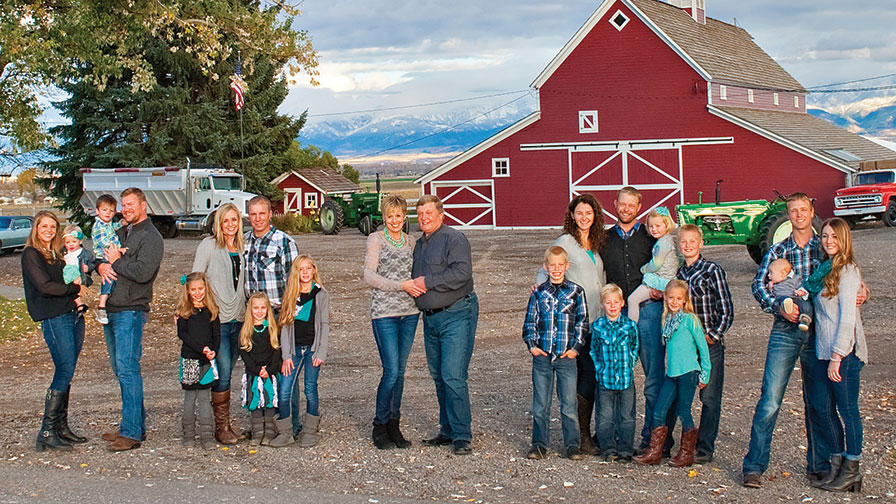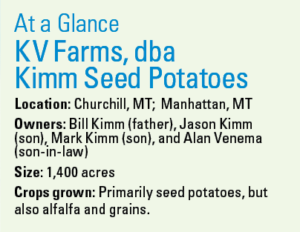How One Family Keeps Its Potato Seed Crop Clean

The Kimm Family
When it comes to finding quality potato seed, the supplier’s reputation is everything. And Kimm Seed Potatoes, located in Manhattan, MT, has one of the best. It’s widely recognized as a reliable producer of healthy, disease-free seed.
That reputation comes in part from how closely it works with the University of Montana’s seed certification program. The U.S. has a crazy quilt system of potato seed certification programs. Each operates on its own rules, which inevitably means some programs have a higher reputation than others.
Montana’s program ranks at or near the top in the U.S., according to various consultants and Extension agents.
 The certification program helps, but Kimm Seed Potatoes also earns its stellar reputation through its culture and meticulous production methods.
The certification program helps, but Kimm Seed Potatoes also earns its stellar reputation through its culture and meticulous production methods.
Lean Heavily on Testing
Kimm Seed Potatoes grows first (G1), second (G2), and third (G3) generation potatoes and primarily sells G2 seed to other seed providers. To have healthy seed to sell, the Kimms begin with careful handling in growing G1 seeds.
G1 fields take up about 35 to 40 acres of the farm’s 1,400 acres. But they start with the nuclear plots. The Kimms hand cut seeds and place them in hand-planted lots.
Each nuclear plant has about 50 to 60 G1 plants. A team from Montana State University (MSU) comes in and begins sampling and testing.
“We’ll test 20 leaves [from each G1 group],” says Bill Kimm, Co-owner.
The farm places numbered flags in the field to track where each sample was taken. If any of the samples come back positive, the crew will not only remove the potato plant, but all 50 to 60 plants that came from the original.
“That’s very important,” Kimm says.
Some plants will express the disease more quickly than others. So even if just one plant in a group comes back positive, there’s a chance the disease hasn’t yet expressed in the other plants.
“That’s being fussy,” Kimm says. “But the farmer has to be fussy, and the people picking the leaves have to be fussy. The kids picking in the fields getting the numbers mixed up can defeat the purpose of the testing.”
Luckily, Kimm says everyone he’s worked with from MSU has been excellent. The G1 groups are the most heavily tested in order to reduce the likelihood of disease outbreaks in future generations. Yet, each generation is still tested.
Recruit “Fussy” People
The Kimms foster and reward those who pay attention to their work on the farm. They seek out those who are fussy, a word of high praise from Kimm.
“If you treat them right, they’ll do the job for you,” he says.
That includes trusting those who have earned it to maintain the same meticulous standards the family members do. It also involves everyday tokens of appreciation, from bringing them ice cream to simply telling them (and their direct supervisor) they’re doing a great job.
React to Pest Threats Creatively
From time to time, Kimm says, you have challenges that come along. And when it comes to disease or insect pressure, answering the challenge requires more than a pesticide.
For example, the Kimms moved one seed plot into an entirely new area, about 10 miles from the valley the family had used for years.
“We had more aphid pressure, so we put it in an area where no other potatoes are around,” Kimm says. “It’s more work, but it’s important to keep our seed lots clean.”
Another way to keep disease pressure down is to adhere to a strict crop rotation. Kimm Seed Potatoes rotates crops on a five- to seven-year cycle — seven is preferred — to keep disease exposure down.
They’ll grow alfalfa for three years, a single year of potatoes, then grow a grain for year, then back to a single year of potatoes, Kimm says.
There’s a bonus to crop rotation: better quality soil. The Kimms give their soil a boost with compost teas. [See sidebar below.]
“I’d rather have G3 seed off of good soil than G2 off of poor soil,” Kimm says.
Invite Customers to Visit
It’s important that buyers can visit the farm they’re buying their seed from, Kimm says.
“They want to know where it comes from, know our program, and how we protected our crop during that particular year,” Kimm says.
“When we sell seed, it’s very important we’re in touch with those buying from us, and that we follow up to make sure they’re happy with us.”
Strive for Healthy Work and Family Relationships
When people love what they do, Kimm says, their work quality soars. You can have the best plans in the world, but if the family doesn’t like working together, things begin to slip.
“Part of our success is we like working together as a family,” Kimm says. “We all have different responsibilities. Jason (Kimm’s son) takes care of the soil health, Alan (Venema, his son-in-law) keeps the maintenance, Mark (his son) takes care of the labor force, and I help out with that. My wife still helps me rogueing potatoes.”
Kimm’s winning formula, however, involves more than a harmonious working relationship.
“You have a good time having fun together,” he says. “We enjoy our lunch breaks — there’s humor there. We have a lot of fun.”
The Kimms Dabble in Organic
Kimm Seed Potatoes has a sideline: organic seed potatoes. It makes up only 3 acres at this point, but it’s an important part of the business.
Jason Kimm, Co-owner of the farm with his father, brother, and brother-in-law, runs the organic division.
A key element of this division is the home-brewed compost tea.
“He brews healthy bacteria for our potatoes from organic compost,” says Bill Kimm, Jason’s father.
Kimm applies 5 gallons of the compost tea per acre.
“It controls aphids and other pests, and the bacteria is very beneficial to the plants, keeps blight away,” Bill Kimm says.
Unless late blight comes in early, Kimm says his son doesn’t apply controls.
The Kimms are impressed with the results and occasionally will use the compost tea on the rest of the farm.
“We use it through the pivots if something happens to the grains. And sometimes we flight it on the potatoes,” Bill Kimm says.
If there’s an increased pressure on the conventional plants, the Kimms will apply compost tea first, then the next treatment is with pesticide two weeks in a row.
“That has been working quite well, as needed,”Bill Kimm says. “That usually starts later part of June — the time of the year we have the most pressure is end of July and early August.”










